 |
|
|
Kurashiki
Friday - May 17, 2002
|
|
|
The next morning, we
visited the aquarium that was just down the road from our hotel.
Inside was an array of fish, otters, penguins and other marine
life.
Then we visited some of the
shops along the way to the ferry to purchase some figures and souvenirs
for the family.
After a brief tour of Miyajima,
we were ready to head for our last overnight stop before returning to Tokyo.
To reach our hotel, we were now facing the most complex part of our trip. |
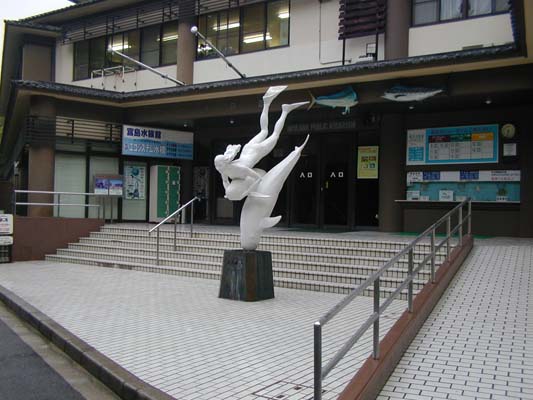 |
|
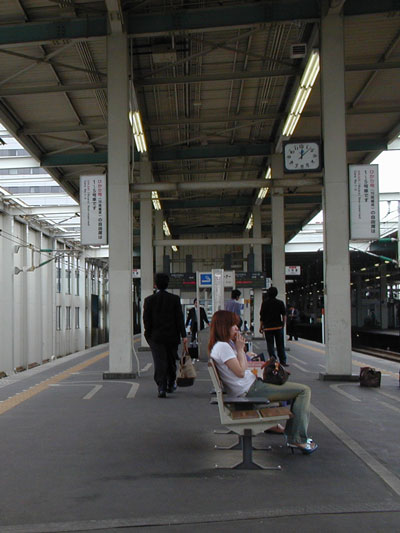 |
From the island, we had to take
the ferry back to the mainland, walk across town, catch the local train to
Hiroshima and reclaim our stuff from the locker. Everything was safe and
sound, even the flagstaffs stuffed behind the lockers. We re-packed our
belongings and managed to fit it all into our two backpacks and one small
bag (except for the flagstaffs, of course). After a quick stop at the
Hiroshima station's McDonalds, we caught a local shinkansen (pictured)
to Shin-kurashiki. Then continued from there via a local train to our final
destination for the day,
Kurashiki.
A quick note about
the shinkansen. They come in 8, 12 and 16 car combinations. It's real
important to know the length of your train so you can be waiting in the
right spot for your particular car. We were standing at the sign for car 3
(see mouse over) only to see the entire train race completely past us. It
turned out that car 3 sign was for a 16 car train and our train was actually
only 8 cars. We raced down the platform loaded with backpacks and bags and
managed to jump onto the end car just as the train was preparing to leave.
As it happened, that car was almost empty, so we just sat there instead of
struggling down the narrow aisles of several cars to get to our reserved
seats. It turned out to be a car with permitted smoking, but we figured we
could hold out for the hour it would take this part of the trip. |
|
|
Keep in mind that we
spoke only a few Japanese words, and most of the Japanese we ran
into spoke little English. We got by with much pointing and our
precious phrase book. Everyone was very considerate and eager to
help us an any way they could. One gentleman passenger pored over
his thick train schedule directory for at least five minutes
in order to assure us that we were taking the right train.
Here, we're looking out over
Kurashiki from the train station. Our hotel was about 1 and a half
kilometers, (1 mile) from here. Considering our tight budget, we
decided to hike there.
|
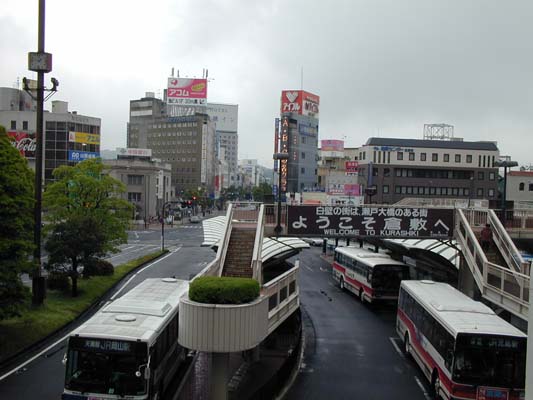 |
|
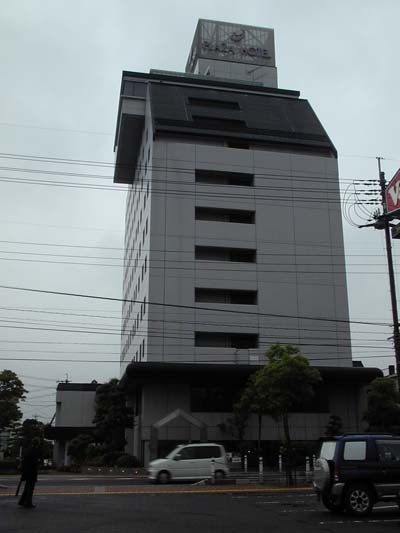 |
We finally arrived at the
Kurashiki Plaza Hotel about 25 minutes later, hot and sweaty and very
ready to check in.
For this last part of the
trip, my main concern was that we get a no frills, simple, low cost hotel.
The travel agency came through big time. ^_^
No shuttle, no ofuro, we're
left to carry our own bags, but that was OK. After five and a half hours
from Miyajima Island to Kurashiki, all we wanted to do was check in and
rest up for a bit. |
|
|
No tatami or
tokonoma, but still a pleasant room. Heh, note the flagstaffs in
the mailing tube and the sword I purchased for Josh in Kyoto in
the bottom-right corner of the photo. We still had them.
I can't emphasize enough how
important a good phrase book can be. We arrived hot, and the room was no
better. We opened the window, but it didn't help much. I could find no
temperature control anywhere. Down at the desk, they knew no English
whatsoever, so leafing through my phrase book, I finally found the kanji
for air conditioning. I pointed to it and said the word for hot. That was
enough for the manager to understand what I wanted and then to sketch me a
diagram showing that the control was a little dial between the two beds. |
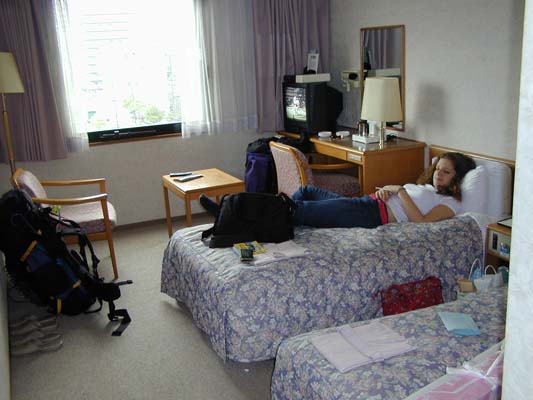 |
|
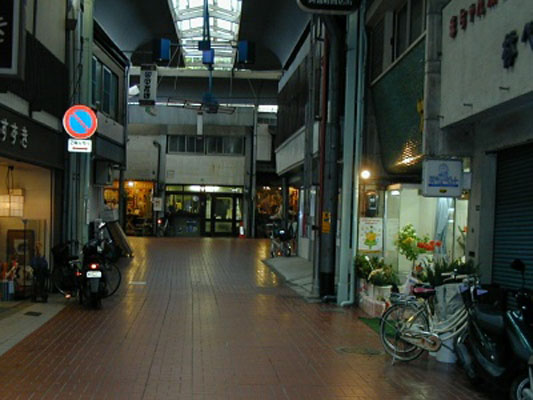 |
It was now time to
find out what was special about this town. Armed with a
map from the information desk at the train station, we headed
into town. No walking this time, budget or no, we decided to take
a taxi. Our first stop was the downtown shopping mall. A long
stretch of tiled streets were apparently roofed and turned into
covered shopping. Oddly, bicycles and even motorcycles cruised
down these same halls along with pedestrians. |
|
|
Apparently, Kurashiki
specializes in a type of pottery called Sakazu-ware. The sign is
inviting you to come in, buy some and you will cherish it always. |
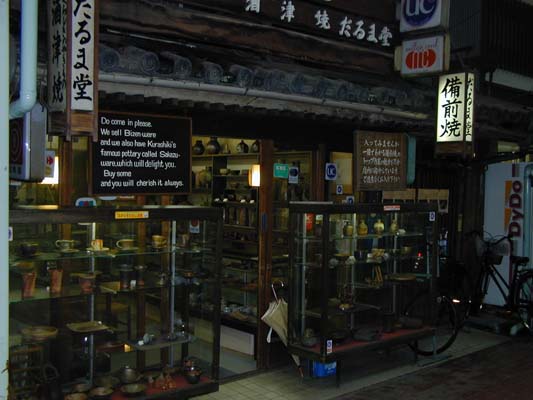 |
|
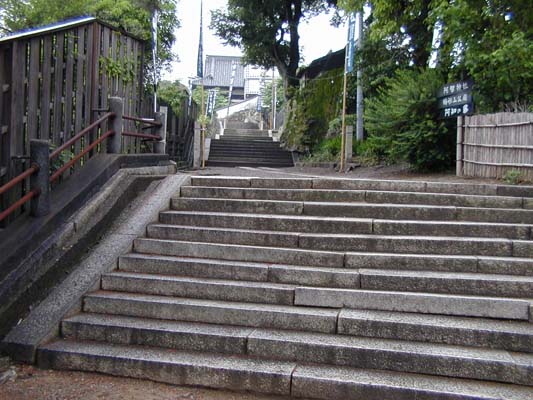 |
After walking throughout the
covered mall for awhile, we saw a stone flagged path exiting the mall and
leading off into the distance.
As we followed the path, we came upon the torii gate (shown in the
mouse over photo), which leads the way to the shrine. |
|
|
As we climbed up the
stone walkway, we came across this little graveyard off to the
side of the path. |
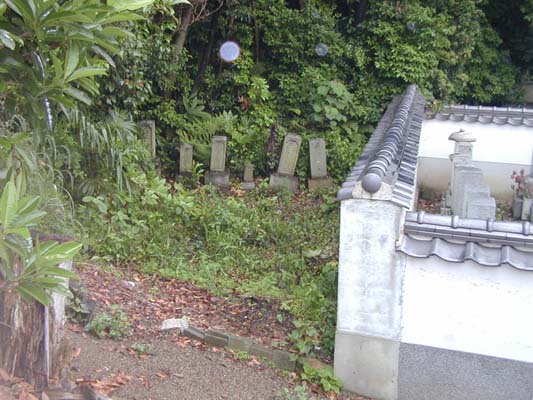 |
|
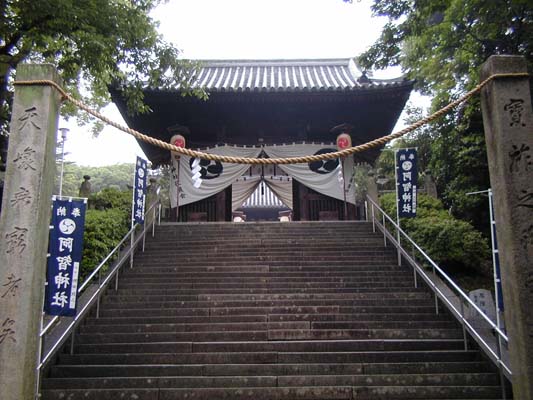 |
After ten minutes of
following the path up and up various steps and stairs, we came to
the Achi Shrine, in the center of the Tsurugatayama Park.
Notice the shimenawa rope and
zigzag paper shime. This marks the boundary between the sacred and the
mundane. Its purpose is to forbid the passage of evil spirits.
|
|
|
Throughout Japan, at
every Shinto shrine, there is a spring of fresh water with long
handled tin cups for purification before approaching. |
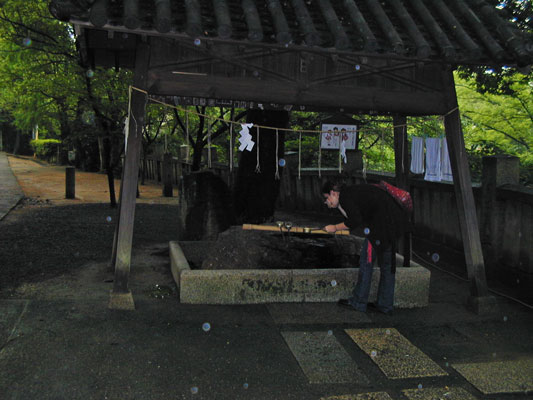 |
|
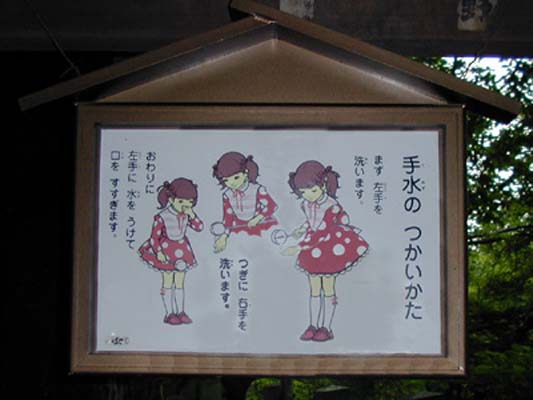 |
In preparation for
entering the shrine, you should follow these instructions. First,
use the cup to scoop up a bit of water. Then use the water in the
cup to rinse off each of your hands. Let the water drip onto the
ground, not back into the spring. Finally, pour a small sample of
water into your palm and then sip from your hand to cleanse your
mouth. If you're following the pictorial instructions of the
little girl in the photograph, remember this is Japan and read it
right to left <smile>. Since it was once again lightly raining, we
headed back for our hotel. |
|
|
Our good fortune continued.
We have been in Japan for a week now and I was having a serious withdrawal
for one of my favorite foods. Lo and behold, directly across from our
hotel was the
Volks Restaurant
which specializes in, yes, beef steak dinners.
I was in heaven!
I ordered their 250 gram
special, medium rare please. Jennifer ordered rice and salad. It was quite
nice inside and felt just like I was back home. It blew our budget, but we
had scrimped enough for one day. ^_^
|
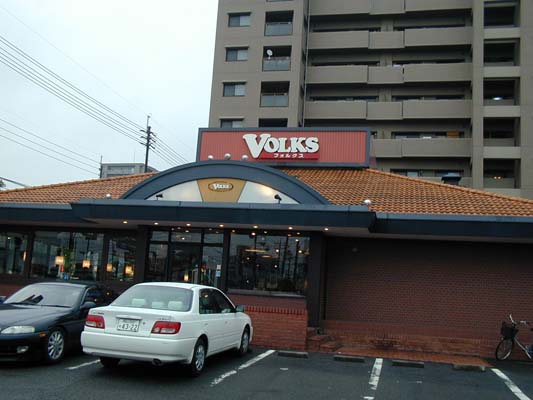 |
|
|